The Best Paris Hidden Gems (That Aren’t Food)
If you’re planning a trip to Paris, I’m sure you’re at least somewhat familiar with the most famous sites: the Eiffel Tower, the Louvre, the Arc de Triomphe. Those are all worth a prominent place in your Paris itinerary. But if you want to get a bit off the beaten path (and you should), check out these Paris hidden gems.
I highly recommend sprinkling your Paris itinerary with at least a few of these secret places in Paris. You’ll have a more well-rounded experience and you’ll be able to avoid some of the tourist hordes at the most popular sites.
Plan the perfect trip to Paris with this free printable travel planner.
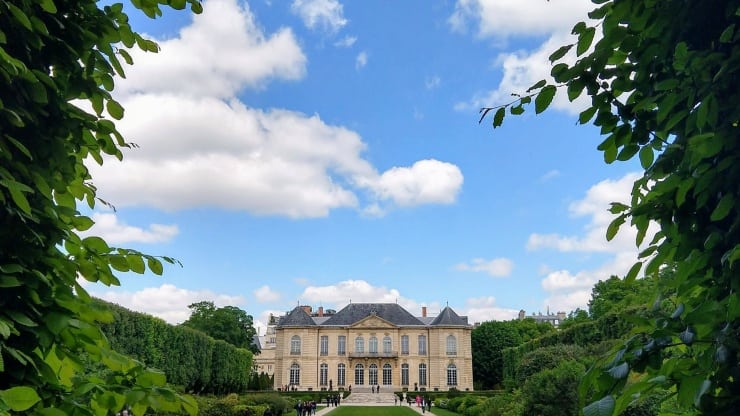
This post includes affiliate links. If you make a purchase through one of these links, I may earn a small commission at no additional cost to you. As an Amazon Associate, I earn from qualifying purchases. See disclaimer.
1. Soak up some quiet and beautiful art in Auguste Rodin’s garden
Sitting in a beautiful garden is one of my favorite ways to relax in Paris. You can enjoy a cup of coffee, read a book, people-watch, or just enjoy the sun.
Tucked away in Paris, around and behind Musee Rodin are beautiful gardens sprinkled with the sculptor Auguste Rodin’s famous statues including The Thinker and Monument to Balzac, created in memory of in memory of the French novelist Honoré de Balzac.
Rodin’s garden is my favorite hidden spot in Paris.
The Rodin Museum itself is housed in the artist’s personal mansion and is absolutely worth a visit. It’s a beautiful house and full of great sculptures like his The Walking Man as well as smaller studies.
You can purchase a ticket for the Rodin Museum ahead of time or use your Paris Museum Pass to get in. I highly recommend that you evaluate your itinerary to determine if a Paris Museum Pass will save you money.
I found that the pass encouraged us to see even more amazing Paris sites than we had originally planned.
TIP: Keep track of all of your important travel details with a digital travel planner like this.
2. Enjoy quiet contemplation at the Deportation Martyrs Memorial
If you’re also looking for free sites to visit in Paris, you should definitely pay a visit to the Mémorial des Martyrs de la Déportation.
The memorial is located on the east end of Île de la Cité and is free for all visitors. It was opened in 1962 and honors the 200,000 people who were sent to the concentration camps from France during World War II.
They ask that you do not publicize any photos of the interior spaces, but you are welcome to take photos for personal use.
PRO TIP: If you have flexible travel dates you need to check out Going (formerly Scott’s Cheap Flights). You get amazing flight deals sent straight to your inbox with instructions on how to book directly with the airlines. Check out Going here. Going is my favorite way to find great travel deals.
3. Get a bit creeped out in Marie Antoinette’s prison
2 Boulevard du Palais, 75001
Once a palace for French kings called the Palais de la Cité, part of the Conciergerie was eventually converted to cells that most famously held prisoners during the French Revolution, including the doomed Marie Antoinette.
In fact, you can visit the executed queen’s prison cell, complete with a commemorative chapel, and walk in the small courtyard area where supposedly was allowed some time outdoors.
Buy your Conciergerie tickets in advance online or use your Paris Museum Pass to save time and money on your Paris trip.
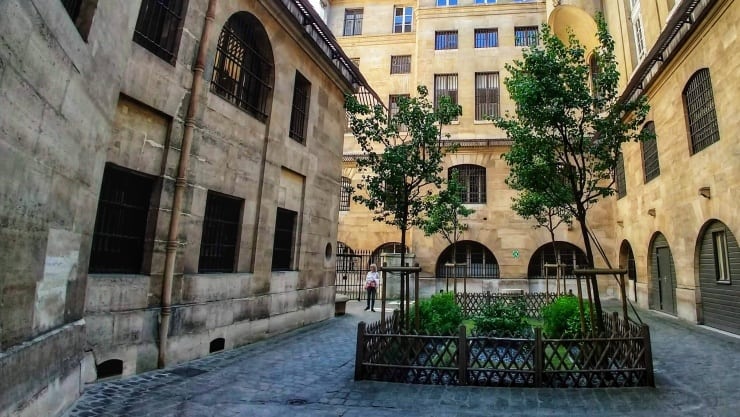
4. Revel in the beauty of Sainte-Chappelle
To call Sainte-Chappelle dazzling would be a bit of an understatement. Its 1,113 stained glass windows create an otherworldly atmosphere that really has to be seen in person to fully appreciate. Only a skilled photographer (i.e., not me) can do them justice.
Sainte-Chappelle was built in a lightning-quick 7 years, commissioned by King Louis IX (Saint Louis) as a home for religious relics like the Crown of Thorns.
Keep in mind that this can be a popular place, and it does lose some of its luster if you’re closer than you wish to be with a swarm of noisy tourists while chapel security is pulling their hair out trying to keep everyone in line.
If you have the time and available trip budget, I would highly recommend that you add an evening concert to your itinerary. I rather regret not doing that, and it’s something I would very much like to do on my next trip to Paris.
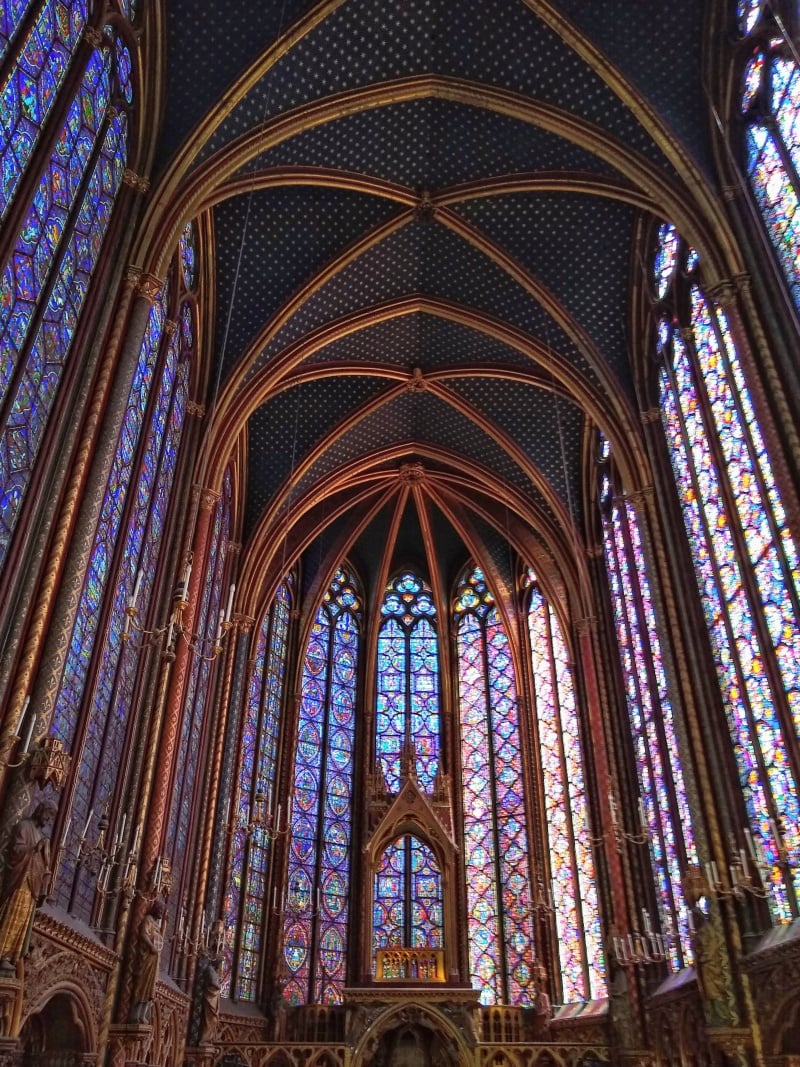
5. Visit the Library-Museum of the Opera (National Library of France)
If my husband had only one day in Paris, he’d probably spend at least part of it at the Paris Opera House (Palais Garnier). This is my hubby’s favorite place in Paris. He has tried both the guided tour and the self-guided tour.
While he did enjoy his Paris Opera House self-guided visit, we highly recommend the guided tour if it fits with your schedule. The guide was so knowledgeable and answered every last question in the group.
One highlight was our detour into the Library-Museum of the Opera, which is actually part of the National Library of France. It includes special exhibits and artwork as well as the preserved documentational history of the opera house and its performing arts activities.
The Paris Museum Pass does not include admission to Palais Garnier.
For a complete discussion, read my Paris Opera House guided tour review.
6. Admire the belle epoque stained glass dome at Galeries Lafayette
Just behind the Palais Garnier (Paris Opera House) you’ll find the belle epoque department store gem Galeries Lafayette. Even if you’re not interested in shopping for high-end Paris fashions or perfume, the store is worth a brief visit even if only to see the stunning stained glass domed ceiling in the center of the store.
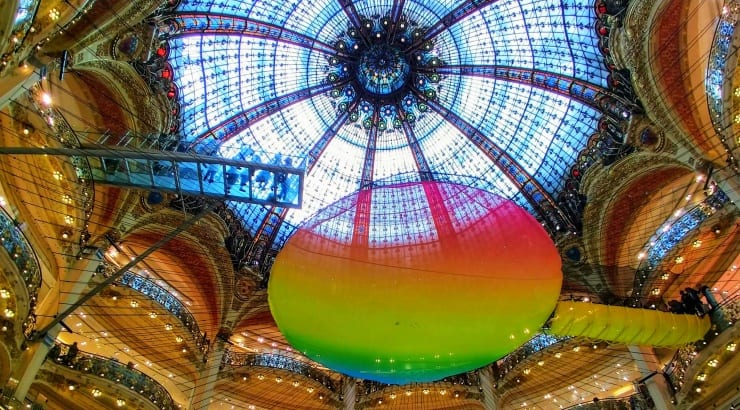
7. View Napoleon’s tomb at Hôtel National des Invalides
Near Musee Rodin, you’ll find the gold-domed Les Invalides. Originally commissioned by Louis XIV, Les Invalides included barracks, a hospice, a convent, a factory, and more.
Inside, under the dome, is Napoleon I’s final resting place. Many years after his death in 1821, Napoleon’s coffin entered the city by horse-drawn cortege under the Arc de Triomphe and was laid to rest under the dome.
You can buy your ticket ahead of time online or use your Paris Museum Pass.
8. Learn more about French history at the Musée de l’Armée
As long as you’re visiting Napoleon’s tomb, why not spend a few minutes walking through the exhibits at the Musée de l’Armée (it’s included in your Les Invalides ticket). Hubby loved browsing all of the uniforms and weaponry.
This is not a small museum, so wear comfortable shoes and be prepared to take your time. If you are like me and might prefer to rest your feet than look at old guns, there is an Angelina’s where you can enjoy a Parisian treat like their famous hot chocolate.
You can buy your ticket ahead of time online or use your Paris Museum Pass to avoid the ticket line.
9. Art Nouveau metro stops
When Paris was building their Metro public transportation system in the early 1900s, it commissioned beautiful entryways to make the visible aboveground parts of the system as attractive as possible.
The entryways were designed by Hector Guimard a pioneer of the Art Nouveau movement in the early 20th Century. Art Nouveau is known for its sinuous curves that reflect shapes found in the natural world.
There are many examples of Guimard’s art nouveau station entrances and Metro signage that you can still find in several places around Paris, including the Abbesses station in Montmartre.
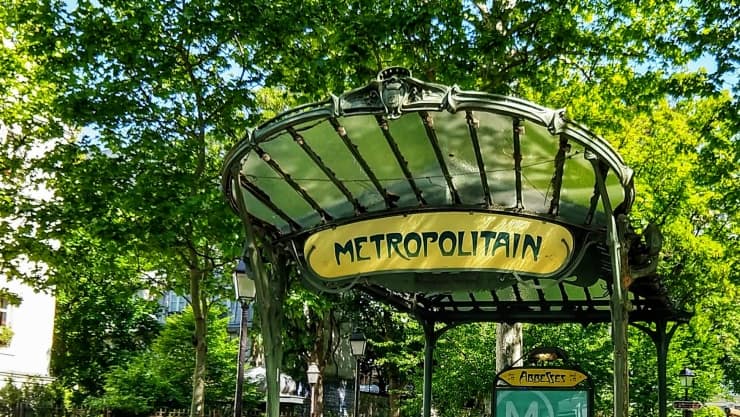
10. Abbesses: Paris’ Deepest Metro stop
This Paris gem is so hidden it’s 118 below ground. Abbesses, on Paris Metro line 12, is the deepest station in the city.
The entrance, designed by Hector Guimard in the Art Nouveau style, was originally designed for the Hotel de Ville station and was moved to Abbesses in 1974. It’s also one of only two remaining édicule entrances of covered glass and wrought iron that resemble dragonfly wings.
You will feel like you are climbing forever, but the station staircase is worth seeing. It’s decorated with images of the Montmartre area around the station, including Basilique du Sacré-Cœur. And once you reach the top you’ll be in lovely and artsy Montmartre.
11. Watch a game of boules (petanque) at Place Dauphine
You’ll find the Place Dauphine at the western end of Île de la Cité, just beyond the 17th Century Pont Neuf (New Bridge) with its statue of Henry IV. The triangle-shaped place is surrounded on all sides by buildings, which makes you feel quite a bit hidden away from the bustle of the city. It’s a true secret place in Paris.
You’ll also feel a bit like you stepped back in time watching some elder citizens of Paris spending their afternoon with a game of boules or petanque.
12. Sit on the very tip of Île de la Cité in Square du Vert-Galant
At the very western tip of Île de la Cité in the Seine is a small park called the Square du Vert-Galant (named for Henry IV). The large trees on the outer edges of the little park make it much less noticeable and more private than you would think considering its location.
Square du Vert-Galant is a wonderful place to enjoy a picnic and have a little quiet moment in the middle of a busy Paris day.
13. Admire the church of Saint-Severin in the Latin Quarter
One of the oldest churches on the left bank can be found in Paris’ Latin Quarter. It’s also reportedly home to the oldest church bell in Paris. The Sainte-Severin you see in Paris today is actually the second church, rebuilt on the site of the destroyed original.
Make time to stop by if you find yourself in the Latin Quarter (and you definitely should). It’s a great reminder of what Paris life would have been like hundreds of years ago.
14. Explore Roman bath ruins in the heart of the Latin Quarter
The Gallo-Roman Thermes de Cluny is considered to be one of the largest remaining ancient ruins in Northern Europe. You’ll find them at the National Museum of the Middles Ages (Cluny) in the Latin Quarter, as they were incorporated into the construction of the museum.
You can explore what is left of the frigidarium (cold baths), which still has some decorative elements intact. The former gymnasium makes up part of the area where you can see the display of the beheaded statuary kings from Notre Dame. Yes, they are kind of creepy.
Use your Paris Museum Pass for museum entry.
More articles about Paris
- Paris one-week itinerary
- Great free attractions in Paris
- How to take a day trip from Paris to Versailles
- Great books about Paris to read before your trip
Pin this post!
